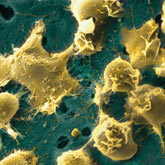摘要:通过特定基因的表达将完全分化的成年细胞重新编程为类似胚胎的状态,这样所产生的“诱导多能干”(iPS)细胞有重要治疗潜力。对于将iPS细胞用在治疗上,人们所期望的优势之一是,由于它们是完全从患者身上获取的,所以它们应能避免免疫排斥。现在看来,事情也许不是这么回事。在将利用逆转录病毒方法或非一体化的附加型方法所重新编程的iPS细胞移植到小鼠体内的实验中,来自iPS细胞的畸胎瘤细胞受到免疫系统排斥,甚至在同基因接受者中也是这样。这个发现表明,从iPS细胞分化出的某些细胞中基因表达的改变会诱导取决于T-细胞的免疫反应。本文作者们提出,从特定患者的iPS细胞获得的有治疗价值的细胞发生免疫反应的可能性,应在将这些细胞应用于患者的任何临床应用之前予以评估。

IPS细胞
生物探索推荐英文摘要
doi:10.1038/nature10135
Immunogenicity of induced pluripotent stem cells
Abstract: Induced pluripotent stem cells (iPSCs), reprogrammed from somatic cells with defined factors, hold great promise for regenerative medicine as the renewable source of autologous cells1, 2, 3, 4, 5. Whereas it has been generally assumed that these autologous cells should be immune-tolerated by the recipient from whom the iPSCs are derived, their immunogenicity has not been vigorously examined. We show here that, whereas embryonic stem cells (ESCs) derived from inbred C57BL/6 (B6) mice can efficiently form teratomas in B6 mice without any evident immune rejection, the allogeneic ESCs from 129/SvJ mice fail to form teratomas in B6 mice due to rapid rejection by recipients. B6 mouse embryonic fibroblasts (MEFs) were reprogrammed into iPSCs by either retroviral approach (ViPSCs) or a novel episomal approach (EiPSCs) that causes no genomic integration. In contrast to B6 ESCs, teratomas formed by B6 ViPSCs were mostly immune-rejected by B6 recipients. In addition, the majority of teratomas formed by B6 EiPSCs were immunogenic in B6 mice with T cell infiltration, and apparent tissue damage and regression were observed in a small fraction of teratomas. Global gene expression analysis of teratomas formed by B6 ESCs and EiPSCs revealed a number of genes frequently overexpressed in teratomas derived from EiPSCs, and several such gene products were shown to contribute directly to the immunogenicity of the B6 EiPSC-derived cells in B6 mice. These findings indicate that, in contrast to derivatives of ESCs, abnormal gene expression in some cells differentiated from iPSCs can induce T-cell-dependent immune response in syngeneic recipients. Therefore, the immunogenicity of therapeutically valuable cells derived from patient-specific iPSCs should be evaluated before any clinic application of these autologous cells into the patients.







